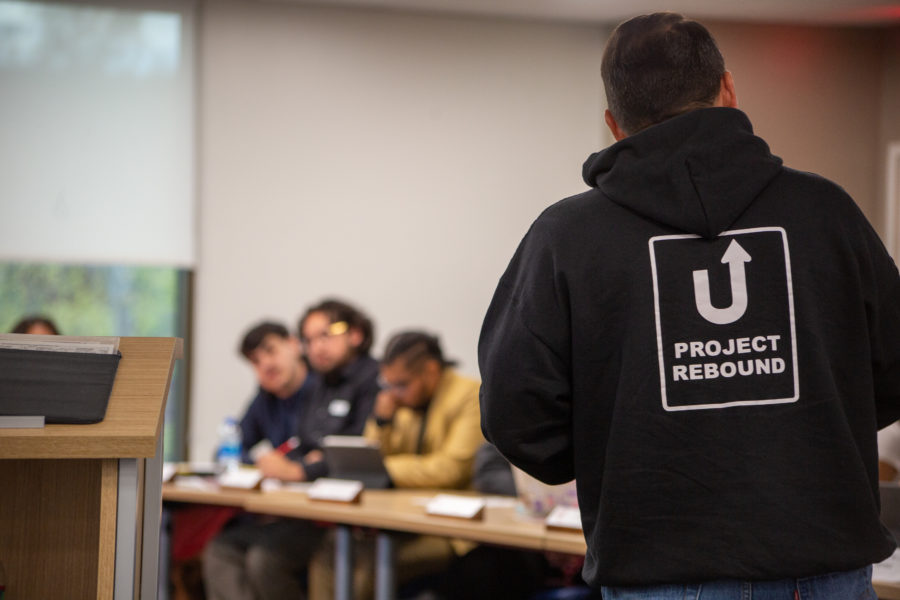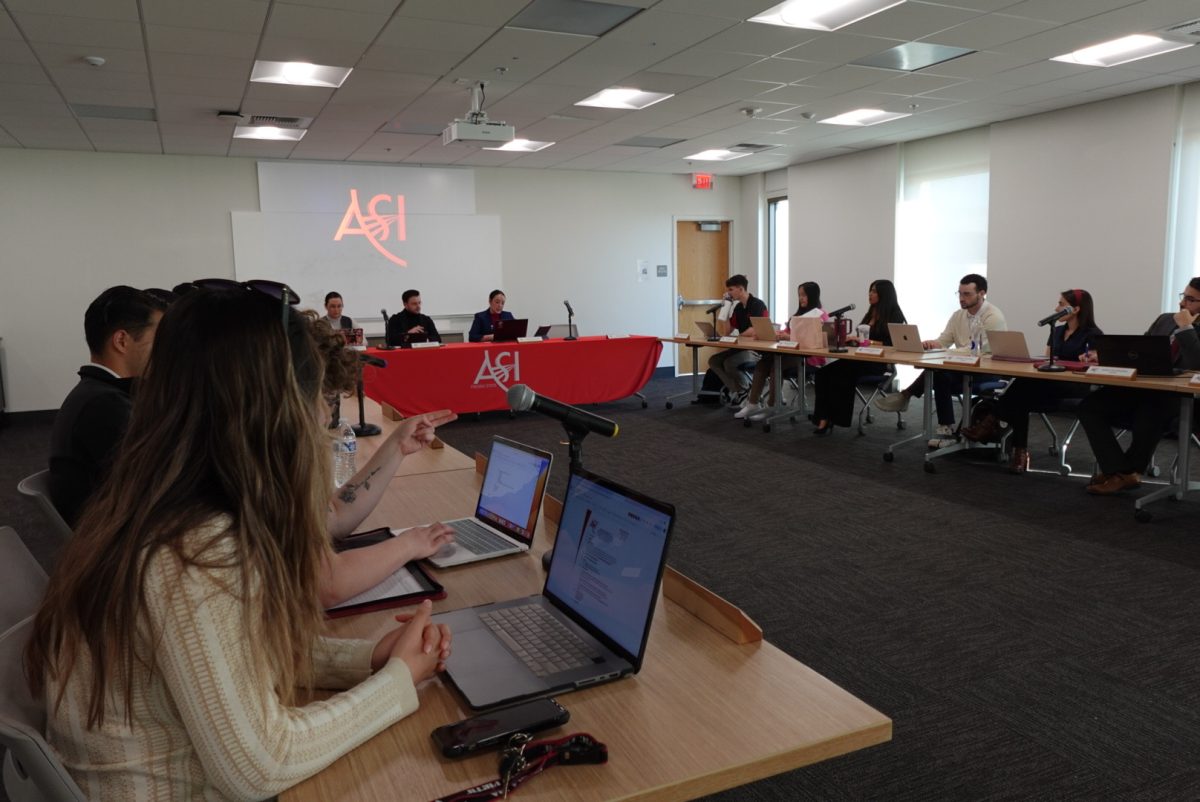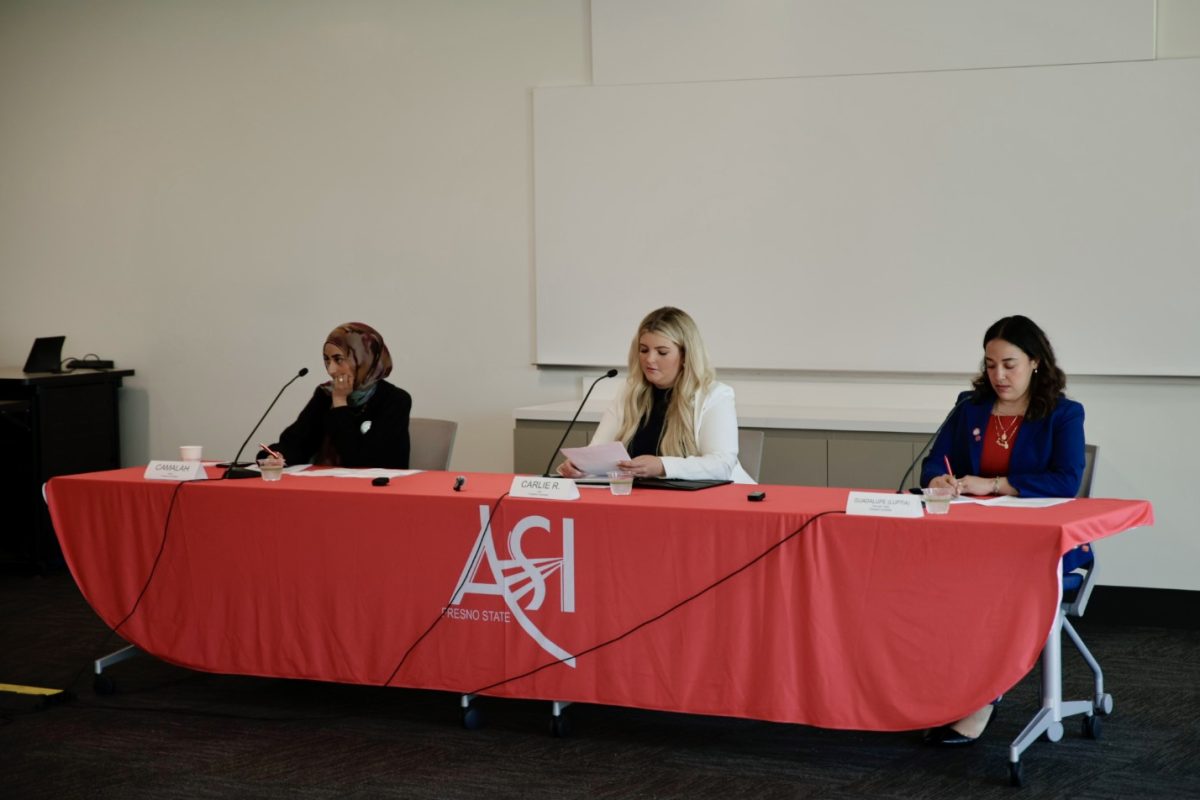Project Rebound launches housing initiative while looking for a new home on campus
Manuel Hernandez/The Collegian
Arnold Trevino, outreach coordinator for Project Rebound, speaks at Associated Students, Inc.’s senate meeting in November 2022.
Apr 13, 2023
Fresno State’s Project Rebound provides resources and opportunities in higher education for those formerly incarcerated. It was established in the CSU system in the 1960s at San Francisco State, and then integrated at Fresno in 2016, along with 14 other CSUs.
Since its implementation, Fresno State’s program continues to grow with the number of students enrolled, 108 overall, and is creating student housing specifically for those in the program. Finance is not an issue, but as Project Rebound expands, it exceeds the space that is currently available.
“We have three offices, but that’s it. There’s only enough room for two students to work in the student office at a time. So we have funding to hire and support financially a student assistant but are not able to because we don’t have the space,” said Jennifer Leahy, director of Project Rebound at Fresno State.
Its offices are located at Room 102A of the Social Science Building. The narrow hallways are plastered with newspaper clippings, awards and images highlighting Project Rebound alumni and students. There is one office for Leahy, another for Arnold Trevino, the outreach coordinator, and the third is the student office.
However, to make room, Leahy oftentimes has to work from home to allow another staff member to take the office. Her goal is to find a space not only to increase its staff, but to create a safe hub for those in the program and those formerly incarcerated.
“I know there’s a lot of movement on campus right now… so I don’t really know what’s available. But what we need is at least four offices and a large gallery,” Leahy said.
She compared the space to something similar to the Cross-Cultural and Gender Center, which is a hub for diverse cultures on campus. Many Project Rebound members, whether they be older or feel isolated after their incarceration, would like a space of their own because they differ from other students, Leahy said.
Many students and members come to the offices for help in subjects like statistics and research methods.
“We rely very heavily on the Learning Center, and the problem with that is my students don’t exactly fit the profile of ‘the average student.’ They’re older with tattoos. They don’t feel comfortable at a table sitting with some 20-year-olds that are third, fourth-generation college students, which is what they encounter,” Leahy said. “So part of what the program does or intends us to do is to build a community of support. And that’s impossible to do when I can’t get them together and hire the staff… I’m managing 88 students. That’s an insane workload.”
Her goal is a bigger space with computers, printers and open tablespaces for students to work together while they study or just relax.
“That’s really critical for students and student support [because then] they’re feeling like they belong,” Leahy said.
Why it’s hard to find on-campus space
Project Rebound is currently working with Elizabeth Lowham, dean of the social sciences, to find a space at Fresno State.
“Finding space on the Fresno State campus requires a team of people across campus. Vice President [Debbie] Adishian-Astone, Associate Vice President [Tinnah] Medina, and Provost [Xuanning] Fu are amongst the team that we are working with to identify space on campus,” Lowham told The Collegian.
There has yet to be a set timeline, and they are still looking for an available space, according to her.
Lowham said this is a challenge lots of programs face on campus because space is hard to find. She noted how Project Rebound has grown quickly over the past couple of years, so they are trying to be “proactive in thinking” about balancing space to give and meeting current needs of students.
Since the program is under her department, Lowham shared her thoughts on having Project Rebound at the social studies building.
“The growth of the program in terms of the students served; their ability to support student success; as well as to retain students, is something that I hope to continue to learn from. My own goals are to continue to support and advocate for the program and the team’s work on campus,” she said.
Much of the wait is on the administrative side. Leahy emphasized the continuing support from the university but knows no timeline with limited campus space and the student housing.
One of the campuses she mentioned as an example was CSU Fullerton. Its student housing is already established and the office space is what Leahy is working toward.
Romarilyn Ralston, executive director for Project Rebound at Fullerton, said it went through similar struggles when trying to expand, reflecting on its “humble beginnings.”
“We were in a very small office. About the size of a prison cell actually, about 6-by-10 [feet], no windows and big, heavy metal doors. We were in that office space for about a year, and then we were given a new space right after we launched the housing initiative,” Ralston said. “We were given a new space, which included two offices, with a window. That was really a beautiful space, and by that time, we had grown to about 30 students.”
Ralston said the program received a new office the same year as the housing initiative in 2018. The program continues to expand in March, creating the Center for Hope and Redemption at CSU Fullerton’s library.
Ralston said the 2016 expansion of Project Rebound was spearheaded by former chancellor Timothy White to include eight additional CSU campuses, including Fullerton and Fresno.
Despite starting in the same year as Fullerton, Fresno State’s Project Rebound has yet to receive a new office space and is still working on its student housing.
Ralston encourages the program at Fresno to continue advocating for its expansion.
“Just continue to voice your needs to administration and continue to lift up the success stories of the students. Showcase their achievements and continue to build. If you build it, they will come,” she said.
Project Rebound’s housing initiative
Project Rebound has basic state allocation funds that are part of the CSU budget, Leahy said. The program received several grants outside of that. One of the highlights was its housing grant that will pay for the house itself and a housing coordinator for formerly incarcerated students.
Leahy said student housing is tough to get as it is, but it’s harder for those who’re incarcerated.
“Our students are even more at risk for housing insecurity because of criminal background and background checks preventing them from accessing housing that other students would normally have access to,” she said.
Unlike regular students, parole officers can check dorm rooms without a warrant, Leahy added. There are other normal college items, such as alcohol, that can get some incarcerated students in trouble.
“College students like to drink and party… but that’s detrimental for my students, who most of whom are in recovery [from addiction],” Leahy said. “So they do not use drugs or alcohol anymore because it’s had a negative impact in their life. But also for those that are under any kind of supervision; if one of your roommates who doesn’t understand how detrimental that is has a substance in the house, my student’s going to go back to prison.”
Student housing will not only protect them from those circumstances but will provide them a comfortable space with people who understand them, Leahy added. It’s also an opportunity to teach those students how to be suitable tenants and find housing.
Project Rebound hired the housing coordinator in March. The coordinator’s role is to teach students crucial skills that are not taught in prison and help them find a new place to live after the dorms.
“They will have developed the skills necessary to be a good resident, and they will have that housing history to increase their chances of finding equitable housing,” Leahy said.
As the new coordinator joins the staff, more space is crammed into one office. Leahy hopes progress can be made soon as the program grows quickly.







